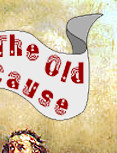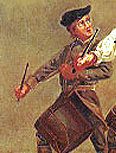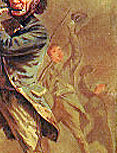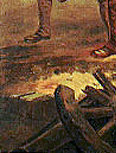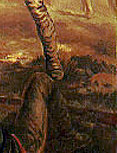ANGLO-AMERICAN
MILLENNIALISM ACROSS THE CENTURIES
The
late Murray
Rothbard was convinced that a particular religious
outlook, post-millennial Pietist Protestantism, had
served as a mighty ideological force for statism in
America from the 19th century forward.1
According to this point of view, it was the duty and
mission of the faithful to improve the world by removing
"occasions for sin" (slavery, alcohol, polygamy,
whatever), thereby ushering in a thousand-year period
of peace and plenty preceding the return of Christ.
This would be the Kingdom of God on Earth (KGE). Bringing
this about, of course, might well require a lot of
state intervention and organized violence (wars against
the Bad) before the peace-and-plenty phase came into
being. I think we can see where this is going.
REDEEMER
NATION WHOSE WRIT RUNS EVERYWHERE
A
classic study of American millennialism is Ernest
Lee Tuveson’s Redeemer
Nation: The Idea of America’s Millennial Role
(Chicago: University of Chicago Press, 1968). Tuveson
traces the notion of a special American world mission
to sectarian English Protestants, who were especially
given to prophetic, apocalyptic and millennial ways
of thinking, during and after the English Civil War
and Puritan Revolution (1642-1660). Such thinkers
repudiated the Catholic and Augustinian view that
secular history was spiritually of secondary importance.
They sough guidance in the Book of Daniel and in Revelations,
two bodies of work that have always proved perilous
to those who wished to find future events outlined
in them.
The
millennialist notion of the KGE came to American via
New England ministers, who were its logical transmission
belt. A whole series of New England divines – "Yankees"
in the most historically specific sense of that term
– handed down and refined that outlook through the
18th and 19th centuries. Toward
the end of the 19th century, many of their
successors retained the post-millennialist program
of state intervention and endless reform but wished
to play down or throw out the sentimental bits (God,
Jesus, and so on). This last stage, which might be
called the Protestant deformation, gave us such worthies
as Woodrow Wilson, John Dewey, and many, many others.
(See Rothbard.)
THE
MISSION UNFOLDS
Already
in the American Revolution there were those who saw
in it the fulfillment of prophecy and the unleashing
of a New Age (Novus Ordo Seclorum, anyone?). It seemed
a perfect fit. As Tuveson notes, English millennialists
had already fused Sir Francis Bacon’s notion of material-scientific
progress through knowledge-as-power with their vision
of the future. The spirit of the whole thing is captured
somewhat in William Blake’s "Jerusalem,"
into the song version of which the Monty Python crew
were always launching at appropriate times in their
sketches.
In
America, where a relatively free economy and immense
unexploited natural resources held out prospects of
boundless progress, such ideas became second nature.
It remained only for Americans to suppose that the
mission to regenerate the world had shifted westward
to their side of the Atlantic Ocean. The words of
Bishop George Berkeley could only have encouraged
them:
"Westward
the course of empire takes its way;
The
four first acts already past,
A fifth shall close the drama with the day;
Time’s noblest offspring is the last..."
(Tuveson, p. 94)
By
the mid-19th century, post-millennial Protestantism
had made great strides in the North. You can trace
its migration through the Yankee belt from Portland,
Maine to Portland, Oregon. All Northern Protestantism
was falling under its sway, with the exception of
conservative Presbyterians and Lutherans. The South
remained immune 'til long after the War of 1861-1865.
Combined
with Manifest Destiny and the notion of Anglo-Saxon
superiority of blood and institutions, the doctrine
of an American mission of world salvation served well
as an ideology of war and expansion. From this standpoint,
the "Civil War" could be seen as a religious
crusade to purify and redeem the Nation, rather than
as a struggle over economic and political issues,
which might have been resolved by other means.
FIFTH
MONARCHY MEN ON THEIR SIXTH CRUSADE
I
have given only the barest outline here. Tuveson’s
book should be read in its entirety by anyone who
wants to understand the long-standing American sense
of boundless world mission. I should not be understood
as saying that Yankee clergymen and their secularized
doctrinal successors, all by themselves, brought into
existence the present U.S. empire. The doctrine does
suggest, however, why American wars take on the moral
tone of the Crusades and why no weapon can be too
destructive or cruel to use in these wars.
With
the Soviet Union out of the picture as threat and
embodiment of evil, we can expect to hear a lot more
about the positive, philanthropic mission of
the empire. We heard a lot about it under the administration
of the Arkansas Caligula. The Yankee school marm’s
lessons continue in more muted form under George W.
Notes
1.
Murray N. Rothbard, "Origins
of the Welfare State in America," Journal
of Libertarian Studies, 12, 2 (Fffall 1996), esp.
pp. 198-210.


